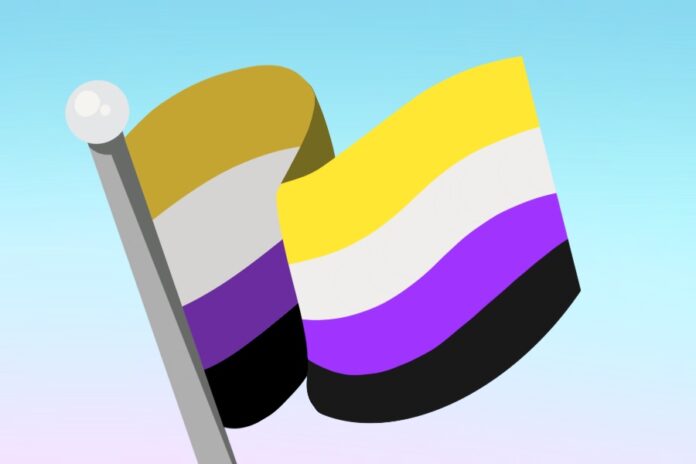Students discuss their journeys toward authentic gender expression
Much of our world is split up into binaries. As a result, our society puts a significant amount of pressure on individuals to demonstrate an identity which fits into a binary standard. With contemporary society’s expanding perceptions of gender, however, many individuals are finding that they do not fit directly into this binary system. The term used to define this identity is referred to as gender non-binary.
The UC Davis LGBTQIA Resource Center defines non-binary as “a gender identity and experience that embraces a full universe of expressions and ways of being that resonate for an individual. It may be an active resistance to binary gender expectations and/or an intentional creation of new unbounded ideas of self within the world.” While it may not be immediately apparent, there are many individuals who attend UC Davis who identify as non-binary. In a 2018-19 student demographic survey, .2% of the UC Davis population marked ‘other’ in the gender category. Compared to the national average — for which non-binary individuals make up .15% of the population — this is quite a significant statistic. This begs the question: is the university doing enough to accommodate this population?
First-year environmental science major Alida Jacobs discovered their gender identity after discussing with a friend the societal norms which place individuals into categories. From their experience, the “female” identity was something they did not connect with, and being referred to by she/her/hers pronouns prevented them from feeling a sense of ownership over their identity and body.
“I realized I was non-binary when I started talking to a close friend about my disconnect between assigned gender and presentation,” Jacobs said. “Especially my disconnect between how the world perceives my gender based on my physical body and how I myself identify.”
Jacobs described feeling a sense of empowerment after their friend began using they/them pronouns for them.
“I physically felt relieved by the feeling of affirmation and the allowance for a third option that my friend’s language allowed me.Then I adopted it all the time for myself whenever it was safe to do so,” Jacobs said.
Similarly, third-year art history major Sedona Patterson-Smith felt a sense of liberation after beginning to use they/them pronouns. They feel that the constraints of gender binary limited their self-expression and a feeling of autonomy over their body.
“I felt like I always had to be compromising part of myself to fit a rulebook for what it meant to be a woman,” Patterson-Smith said.
Patterson-Smith feels that a lot of the restrictions associated with womanhood are based on antiquated gender ideals constructed by society as a form of oppression.
“I now feel less pressure on myself to be accepted by other people,” Patterson-Smith said. “Also, using they/them pronouns has allowed me to feel more included in conversations which address one gender or the other for no good reason.”
The university has some accommodations for transgender and non-binary students, such as gender-inclusive restrooms and various transgender resources. On a classroom-to-classroom basis, however, instructors and professors often take it upon themselves to try and acknowledge non-binary students by asking for students to state their preferred pronouns as a part of their introductions. This practice — while being an acknowledgement of non-binary gender — can be as alienating as it is accommodating. Fourth-year communication major and theater-dance minor Bex Nava-McLellan identifies as non-binary and trans-masc (transgender masculine). He feels as though this practice from instructors and professors puts him in situations in which he feels outed.
“I don’t know if I like it when people are asked to say their pronouns in the beginning of class because I don’t feel comfortable being out to a lot of people,” Nava-McLellan said. “It takes time for me to let people know I’m non-binary, so I either have to come out or lie.”
Patterson-Smith has had a different experience with this practice.
“I think it’s nice when professors ask name and pronouns,” Patterson-Smith said. “Even just that acknowledgement of the presence of non-binary people in your space, really plants that seed to be conscious of others.”
There are many challenges associated with being non-binary that may go unnoticed. According to Jacobs, individuals can alleviate some of this pressure by having a general sense of responsibility to be both cognizant and accommodating of non-binary people.
“I love it when people ask for my pronouns because it shows me that they have done or are willing to do the mental work of categorizing someone by gender not solely on their presentation,” Jacobs said.
Further, Nava-McLellan feels there is a tendency to boil an individual down to their gender identity or expression. He believes that if more people viewed transgender and non-binary people as more than just their preferred pronouns, these identities would be more humanized and normalized.
“When people are exaggerating parts of my life in order to fit some typical narrative that they have of queer people, I feel they are disregarding other aspects of my identity,” Nava-McLellan said.
Jacobs hopes that society will stop making judgements on the identities of individuals based on their outward appearance. They hope that by using they/them pronouns in a public space, they can bring attention to the existence of non-binary individuals and destigmatize transgender and non-binary people.
“I hope that by stating my pronouns and being visible, I can let other people who might be questioning their gender identity know that there is another option, that there is no set androgynous aesthetic that you must conform to in order to identify as non-binary, and that we’re all just ordinary people” Jacobs said.
Written by: Miki Wayne – features@theaggie.org




